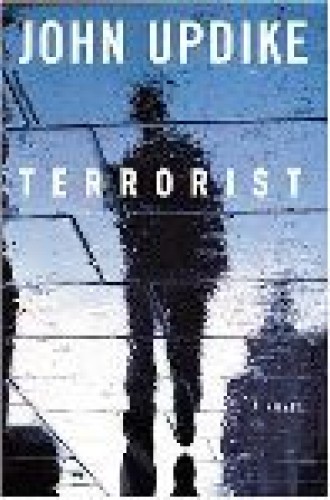Extremists
In creating the character of 18-year-old Ahmad Mulloy, John Updike has imagined what some of us fear most—a homegrown terrorist. Born in the U.S. to an Irish-American mother and an Egyptian father, Ahmad is raised by his mother—who is exactly the wrong kind of parent for him. His mother believes in leaving children free to find their own way; he longs for direction. She likes creative chaos; he craves order. She, a lapsed Catholic, has little use for religion; he, something of a mystic, longs for God.
So at age 11 Ahmad takes himself to a nearby mosque and begins to study the Qur’an, tutored by the mosque’s sinister imam, Shaikh Rashid. Ahmad’s best qualities, his desire for God and longing for a serious and meaningful life, make him an easy tool for others to manipulate. The formation of a terrorist begins.
Updike presents one of the bleakest views of American society to appear in many years. The former mill town where Ahmad grows up, New Prospect, New Jersey, is long past its days of prosperity and hope. It’s a place of slums, strip malls and rubble. To Jack Levy, the depressed guidance counselor at Ahmad’s school, it’s emblematic of America—“paved solid with fat and tar, a coast-to-coast tarbaby where we’re all stuck.”
Ahmad sees Americans as people infatuated with “things that can be bought” and deluded into thinking that safety lies in accumulation and in “the corrupting diversions of the television set.” Jack’s wife finds her meaning in food, overeating until she reaches whalelike proportions. Ahmad’s mother retreats into producing art that no one wants and engaging in a series of disappointing affairs. Joryleen, the smart, well-spoken girl to whom Ahmad is attracted, becomes a prostitute, rented out by her boyfriend, Tylenol.
In this dystopia only fanatical religion seems to thrive. Jack is a nonobservant Jew who married a church-going Lutheran. “Religion meant nothing to him, and as they merged into a married entity it meant less and less to her. . . . Now he wonders if he has deprived her of something, however grotesque, and if her constant chatter and her overeating weren’t compensatory.” Joryleen goes to church because she loves to sing but doesn’t take the rest of it “all that seriously.” Only the evangelical Christians, off in Washington making a mess of the world, loudly proclaim their faith.
In this America, the God-obsessed Ahmad is an outsider indeed. But Updike never makes clear why the teenager has remained isolated from New Prospect’s sizable Muslim community—why, except for Shaikh Rashid, he hasn’t found any companions in his faith. When Ahmad finishes high school and takes a job recommended by Shaikh Rashid, driving the delivery truck for a Lebanese family’s furniture store, he does make a friend, Charlie Chehab, the 35-year-old son of the store’s owner. Like the shaikh, Charlie is mysterious to Ahmad. There’s a look in his eyes, a meaning behind his words that Ahmad doesn’t understand.
Ahmad is “wrapped in his sensation of God standing beside him—so close as to make a single, unique holy identity, closer to him than his neck vein, as the Qur’an expresses it,” and he fears that because of this, “he notices fewer mundane details than other people, unreligious people.” He sees the world in black and white, and there’s no one to correct his overidentification with God and his failure to see God in others.
A great weakness of the novel is that the only Muslim characters in it are this naive, oblivious boy and the people who manipulate him. It doesn’t present Islam as a complex faith practiced by many kind and spiritual people who take part in ordinary life and are good citizens. Ahmad encounters only a religious teacher whose insincerity he senses and a work friend whose contradictory words and actions puzzle him.
A plot in which a naive young man heads toward committing a horrific act while others race to stop him seems sure to be exciting. But Updike’s novel has little excitement or suspense. When his talky narrative finally switches to action, it’s all rush, coincidence and unconvincing motivation. Updike often confines readers to Ahmad’s consciousness, and there he reveals not complex motivations but only stereotypical interior monologues about the devils who try to disturb Ahmad’s faith and the satanic people who try to lead him into sins of the flesh.
Ahmad speaks and thinks in a formal, stilted language unconvincing in an American-born teenager, however disaffected. He is too slight a character to hold the reader’s interest—or to give us much insight into terrorism. Updike’s novel comes alive only in the sections about the kinds of people and situations he has long depicted—when he writes about Jack’s affair with Ahmad’s mother, or Jack’s wife’s wonderful musings about soap operas or her attempts to lose weight.
Yasmina Khadra, a former Algerian army officer now living in France, started out as a writer of mystery novels. That background is evident in The Attack. Set in Israel and Palestine, it presents a suicide bomber’s motivation and mind-set as a puzzle to be solved by the person who loved and trusted her—her unsuspecting, devastated husband.
Amin Jaafari, a Bedouin Arab, is a singular kind of Palestinian, one who has become almost completely assimilated into Israeli society. With intelligence and determination he fought his way into the best medical school, graduated first in his class, became a naturalized Israeli citizen and established himself as a celebrated surgeon in Tel Aviv. He’s shared his success with his beautiful Palestinian wife, Sihem. They have a fine house in the city’s best neighborhood, and they’re invited to parties given by Israel’s wealthy and famous. Though Amin and Sihem remain nominally Muslim, all of their friends are Jewish, and they are very, very happy. Or so Amin thinks.
When a suicide bomber strikes in a nearby fast-food restaurant, killing 19 people, 11 of them children attending a birthday party, Amin is at the hospital. He works long hours trying to save the lives of the wounded, believing that his wife is on a farm near Nazareth, visiting her grandmother. When the police summon him to the morgue to view Sihem’s shredded body and tell him that the forensic evidence indicates that she was the bomber, his world shatters.
A note that his wife mailed to him before her death forces Amin to accept that she was indeed the bomber and that he never truly knew her. It’s clear to him that she has destroyed his life along with her own. Emotionally in agony, he is brutally interrogated, his right to practice his profession is taken from him, a mob attacks and beats him, his house is vandalized, and he can’t stop thinking about the children his wife killed. But he refuses to dissociate himself from her and begins an obsessive quest to understand how she could have done what she did.
Amin is not an entirely reliable narrator of that quest. In order to understand his wife, he has to see himself and the political realities around him more clearly, and in that he only partially succeeds. In the end, he refuses to face all the implications of what he discovers or to change his stance toward life.
In one of the worst battlegrounds of our time, Amin had “refused to consider the world as a battlefield.” “I could see that wars beget wars, that reprisals follow reprisals, but I forbade myself to give them any support of any kind,” he reflects. “I didn’t believe in prophecies of discord, and I couldn’t bring myself to accept the notion that God could incite his subjects to take up arms against one another and reduce the exercise of faith to an absurd and frightening question of power relationships.”
The novel makes us ask, What does one do with such admirable convictions? Amin stubbornly holds to a noble-sounding partial truth: “For me, the only truth that counts is the one that will help me pull myself together and go back to my patients. Because the only battle I believe in, the only one that really deserves bleeding for, is the battle the surgeon fights, which consists in re-creating life in the place where death has chosen to conduct its maneuvers.” But is a fine hospital in Tel Aviv the only place where this battle can be fought? Are the prosperous people there the most in need of a talented Arab surgeon? What about the embattled people of Jenin or Bethlehem? Why has Amin never thought of re-creating life in those places?
Khadra is a remarkably fair-minded writer who vilifies or dehumanizes no one in this novel, whether Israeli or Palestinian. Amin’s Jewish friends go to great lengths to support and help him. When, against their advice, he insists on going back to Palestine, even the Palestinians whose lives are endangered by his presence try to help him, and his long-neglected family welcomes him joyfully. But as he witnesses the destruction of Jenin, Amin wraps himself in his high-minded idealism and remains detached. He’s the kind of character Graham Greene so scathingly exposed in The Quiet American.
In a time when blind idealism has replaced Realpolitik in our government, with devastating consequences, Khadra’s novel is especially relevant. Its characters, Israeli and Palestinian, have many insightful things to say about suicide bombers. To some they’re automatons overtaken by forces beyond their control. To others they’re courageous freedom fighters using the only weapon at their disposal. Some see them as brutes, others as human beings who have been so humiliated that only a “heroic” death can cleanse them. But finally the mystery remains. How could Sihem, however humiliated, however driven to compensate for her husband’s indifference to their people’s plight, have chosen to blow herself up in the middle of a children’s birthday party? Khadra’s suspenseful and psychologically probing novel refuses to give easy answers.







